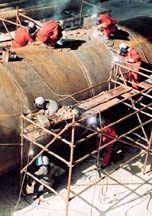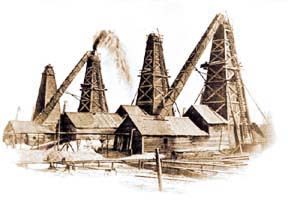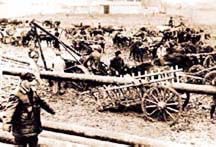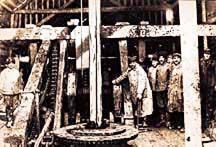|
Autumn 1998 (6.3)  Back to the
Future by Terry D. Adams Baku has been at the crossroads of history for centuries; it was an important trading center on the "Silk Road" from China to Europe, a key player in the Russian Revolution, and a significant part of the story of the Soviet Union thereafter. Over the ages, Azerbaijan has suffered from being a country over which the influence of regional geopolitical powers has ebbed and flowed, but in the 20th century, it is the story of Baku Oil that has dictated its tempestuous past. There is a long record of British interest in Baku and by comparing our experiences today with the records of various British missions to Baku, we can see the cyclical nature of the history of the region.
This report was written more than 400 years before another trader from British shores beat a path to Baku in the shape of BP, leader of the AIOC oil consortium formed in 1994.
One of the first oil gushers of the Nobels in Baku (circa 1880s). In 1905, a book describing these events was published in London. It was compiled by the well-known British oil journalist of the period, J.D. Henry, whose observations over 90 years ago carry a certain resonance today. He wrote: "Twelve months ago, the man who knew nothing of oil was ignorant of Baku; today Baku is known to millions." When AIOC was formed in Baku
four years ago, few people outside of Azerbaijan were aware of
what was happening in that then turbulent city. Access was difficult
and, other than from Turkey and Russia, international airlines
did not fly to Baku. More recently, British Airways still boasted,
"We fly everywhere - from Aberdeen to Azerbaijan."
Now, however, there are many carriers. In addition, current affairs
in Baku is a common item on British and U.S. television and in
the international press.
Left: Construction of the oil Pipeline from Baku to Batum in 1928. Right: One of the early oil wells at the turn of last century.
In 1994, the race for oil was repeated when the AIOC investors signed what Azerbaijanis like to call, the "Contract of the Century." Henry added: "The Government of Azerbaijan is most anxious to assist in oil development and have granted many important privileges." We see further echoes in President Aliyev's oil strategy in the 1990s which has been central to the creation of international alliances so important to securing the independence of the Azerbaijan Republic the second time around.   The British Oil Administration One part of this great historic scene was the appointment on November 17, 1918, of British Army officer General V. Thompson to run in Baku what was known as the British Oil Administration. This was not a universally welcomed arrangement either in Baku or beyond, but the challenges faced by General Thompson were, in large part, duplicated nearly 80 years later when AIOC embarked on its high profile Early Oil project. The British Oil Administration was only a small element of the dramatic events that were the last vestiges of the "Great Game" that was being so ruthlessly enacted in Baku. The practical lessons from this early British oil initiative, however, hold clear messages for the present. General Thompson's reports from 1918 can be seen in the archives of the Foreign Office, and they make revealing reading today. He expressed with great clarity what he believed was required, in order to stabilize the potential and economic situation in Baku which was increasingly chaotic. Collapsed System These same words could have been written in December 1994 when AIOC set up its first oil operations in Baku. In the early 1990s, the Second Republic faced very similar challenges as had the First Republic. Baku was suffering from a collapsed economy resulting from the demise of the contemporary Russian empire, the Soviet Union, and it was (and still is) in a state of war over territorial threats to Karabakh. In 1918, General Thompson was faced with an enormous challenge to recreate confidence in the economy. His fundamental requirement was to recreate a sound and reliable banking system. He wrote, however: "the political situation in Baku does not permit the opening of a British Bank because this would have increased suspicion and jealousy as to British intentions." The Chief Executive of the British Bank of the Middle East in Baku might have voiced similar thoughts when the creation of a sound international banking sector became a key priority for the Second Republic, too! Oil Workers SOCAR (State Oil Company of Azerbaijan Republic) and the Cabinet of Ministers faced the same problem in 1994. An unpaid and hungry workforce was an unfortunate but frequent feature arising from the collapse of the Soviet Union as a whole. In 1918, however, General Thompson was able to add: "On the whole the Azerbaijan workers can be compared most favorably with labor in England which is very patient. They respond to just treatment. Generally speaking, the Azerbaijani is industrious and in Baku few Muselman idlers are to be seen." In Baku, some 80 years later, the same sentiments apply. The patience and tolerance of oil workers in Baku and elsewhere in Azerbaijan is heroic and demands respect. Without their diligence, commitment and expertise, the AIOC Early Oil Project would never have been achieved on time (in 1994). Transportation Links There was an urgent need for regional co-operation. Regrettably for the First Republic, this was not forthcoming. Fortunately, in the 1990s, Azerbaijan and Georgia have a true commonality of purpose in their political and commercial endeavors, aided by the coincidence of respective political leaders, President Aliyev in Baku and President Shevardnadze in Tbilisi, of unusually significant stature. On the specific issue of oil, General Thompson focused on the critical importance of keeping oil pipelines to the Black Sea in working order. "Pipeline operations have ceased because of a tariff war between Azerbaijan and Georgia and the pipeline was damaged. However, the pipeline has been repaired and is now in working order; but owing to Georgia refusing to pay for oil, pumping has ceased. Consequently, producers in Baku have shut in wells and storage is full." At various times, this stored oil was seen by all of Britain, Germany and Russia as a potential prize; but that is another story. Regional Instability This passage reflects concerns that impact equally on AIOC today. They are refurbishing the same pipeline route through Azerbaijan and Georgia to a new Black Sea terminal at Supsa and the same unresolved conflict of Karabakh is a continuing threat to stability and security in the Caucasus. Also, the ordinary workers of Baku still await their just rewards. The issue of Karabakh has been the critical conflict for Azerbaijan in the 20th Century. It played a significant part in the collapse of the First Republic in 1920 and is still a threat to the stability of the Second Republic. The outbreak of ethnic conflict in Karabakh in March 1920 was of considerable concern to British diplomats in London. Foreign Office records testify to the serious thought that was given to initiatives that might effect a settlement: "A strong foreign protectorate is desirable for Karabakh. We can begin by ruling out the participation of Russia, England and Italy; whose presence could not be trusted. There remains France and the United States, and perhaps some other minor European powers. A mandate for the United States would suit best, but there is little hope that they will come forward. Therefore, the best hope for a practical solution seems to be with the French." This diplomatic note is dated May 13, 1920. A comparison to the Minsk Group initiatives of the OSCE (Organization of Security and Cooperation in Europe) for the resolution of the Karabakh conflict are currently stalled. A comparison to the past is too self-evident for comfort. As the perceptive Henry observed in 1905: "Practically the chief thing wanted to ensure the return of prosperity to Baku is lasting peace, not a patched-up arrangement between the fanatical races of the Caucasus, but a real and permanent peace guaranteed by military force with the assistance of foreign capital to develop the oil resources of the region." Flags Follow Trade The role of President Heydar Aliyev and the political significance of the Azerbaijan oil policy have already been mentioned. Unlike General Thompson and his contemporaries, President Aliyev and his administration have directly addressed the fundamental need to create confidence in the Azerbaijan offshore oil industry, thereby ensuring that "flags would follow trade". This policy has been dramatically successful. The oil contracts strategy has resulted in the establishment of alliances with key capitals around the world; in the United States, Russia, Britain and France. Regional interests are well served through the direct participation of Turkey and Iran and East Asian interests are represented by Japan. There are now 13 national interests present in the 14 Production Sharing Agree-ments (PSAs) approved to date. The Caucasus still has to live with its historical inheritance which includes territorial and ethnic tensions, but the geopolitical importance placed on the region by the United States, the European Union, Turkey, Russia and Iran is reassuring to the investor. It seems that the economic and political realities of the region have fundamentally changed and, in contrast to the Russian Federation, Azerbaijan has experienced an explosion of international activity in pursuit of another Oil Boom. It seems appropriate to allow General Thompson the last word: "The general situation in Azerbaijan depends almost entirely on the town of Baku. Owing to its oil wealth, the town of Baku has an influence far out of proportion to its size." Terry Adams is the Executive
Director of Monument Oil and Gas plc, London. He was the Founding
President of AIOC (Azerbaijan International Operating Company),
the giant consortium which was dubbed as the "Contract of
the Century" by Azeris in 1994 for the development of the
gigantic offshore fields of Azeri, Chirag and Gunashli. |


 The First Oil Boom
The First Oil Boom

